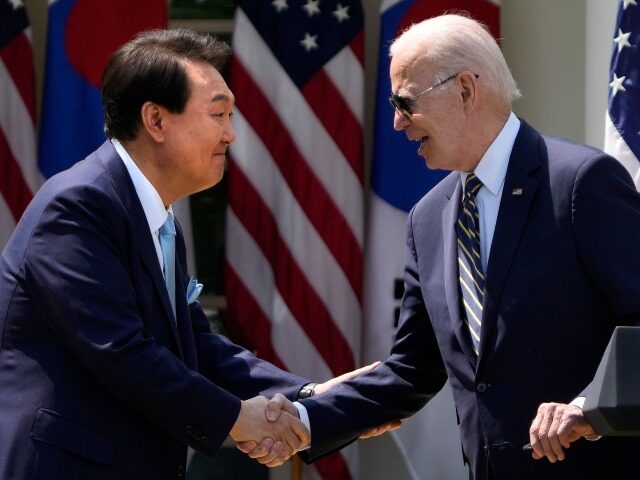The Chinese Foreign Ministry and the Communist Party’s media arms ardently condemned conservative South Korean President Yoon Suk-yeol on Thursday for coming to an agreement that would see the return of American nuclear submarines to the Korean peninsula, warning he had “likely” caused a “nuclear crisis.”
Yoon spent this week in Washington, DC, for extensive meetings with his left-wing American counterpart President Joe Biden and several other engagements, including a prestigious state dinner and an address to a special joint session of Congress. Yoon, who has been in office for almost one year, has experienced significant friction with the Biden White House on the issue of North Korea, on which Biden appears to have no coherent policy. The Biden administration’s apathy towards North Korea has not gone unnoticed in South Korea, where calls for a nuclear weapons arsenal separate from America’s have grown.
“The fact that the nuclear-armed North is not a priority for the Biden administration makes the Koreans nervous,” South Korean lawmaker Lee Jae-jung explained on Tuesday.
Polling shows that most South Koreans support their country developing a nuclear weapons program, given that it remains embroiled in a 70-year-old war with its nuclear neighbor to the north, communist North Korea. Yoon himself floated the possibility of launching an independent nuclear weapons development program in January after North Korea’s communist dictator Kim Jong-un ordered an “exponential increase of the country’s nuclear arsenal.”
“The Republic of Korea could deploy tactical nuclear weapons or possess its own nukes,” Yoon said, predicting, “it won’t take long for us to have one [a nuclear bomb], given our scientific and technological capabilities.”
The main result of Yoon’s visit to America this week, scheduled to celebrate the 70th anniversary of bilateral ties between Seoul and Washington, is a document that the White House branded the “Washington Declaration,” which features extensive security commitments to South Korea and a promise, in turn, not to resort to nuclear development. The declaration reads:
The ROK [Republic of Korea, South Korea] has full confidence in U.S. extended deterrence commitments and recognizes the importance, necessity, and benefit of its enduring reliance on the U.S. nuclear deterrent. President Yoon reaffirmed the ROK’s longstanding commitment to its obligations under the Nuclear Nonproliferation Treaty as the cornerstone of the global nonproliferation regime as well as to the U.S.-ROK Agreement for Cooperation Concerning Peaceful Uses of Nuclear Energy.
The latter sentence is a promise not to develop nuclear weapons. In exchange, the document continues:
[T]he United States will further enhance the regular visibility of strategic assets to the Korean Peninsula, as evidenced by the upcoming visit of a U.S. nuclear ballistic missile submarine to the ROK, and will expand and deepen coordination between our militaries.
The planned presence of an American nuclear submarine on the Korean peninsula for the first time since the 1980s alarmed Beijing, which branded it a direct threat to China.
“If the US really deploys nuclear weapons or a nuclear-armed submarine in the peninsula, it’s very likely to trigger another nuclear crisis,” a Chinese regime-approved Korean issues “expert” told the Chinese state-run Global Times newspaper on Thursday.
Another such “expert” declared that the presence of an American nuclear asset in Korea was “unacceptable” because it was too “close to China’s territory.”
“If the US receives no opposition or retaliation from China, it will deploy more strategic weapons including aircraft carriers and strategic bombers,” that expert, “research fellow” Wang Junsheng, warned, encouraging Beijing to respond aggressively.
The Chinese Foreign Ministry condemned the Washington Declaration on Thursday as a threat to “regional peace,” while abstaining from criticizing North Korea’s promise to greatly increase the number of nuclear bombs in its possession.
“The US has been a source of tension through exploiting the issues on the Korean Peninsula. The US behavior is a result of its Cold War mentality,” Foreign Ministry spokeswoman Mao Ning told reporters during her regular briefing on Thursday, continuing:
What the US has done stokes bloc confrontation, undermines the nuclear non-proliferation system and hurts the strategic interest of other countries. It has also increased tensions on the peninsula and jeopardized regional peace and stability. This is the very opposite of the goal to denuclearize the peninsula and we are firmly against this.
In an editorial on Friday, the Global Times attacked Yoon for an “unrealistic” aspiration to protect his country with America’s nuclear arsenal.
“To elevate the irregular nuclear dialogue mechanism to a regular one and to send Ohio-class nuclear submarines deployed in Guam to South Korea on a regular basis, it is more of a psychological comfort to South Korea,” the editorial claimed, “but for Northeast Asia, it is like inviting a wolf into the house.”
“Its hidden side – targeting China – is also a potential hazard for South Korea,” the Global Times continued. “In the face of Yoon’s return from the US, clear-minded South Koreans will be concerned and cannot possibly be delighted.”
Yoon has spent much of his presidency condemning communism, if not necessarily China directly, and took the opportunity on Thursday to address Congress to do the same.
“The U.S. leadership established a new world order based on free trade, and both peace and prosperity throughout the world – but prosperity was limited to free market economies where communist and totalitarian nations did not participate,” he told lawmakers. “The difference is stark between Seoul, that chose freedom and democracy, and Pyongyang, that chose dictatorship and communism.”
“North Korea has abandoned freedom and prosperity, and missed peace. North Korea’s nuclear program and missile provocations hold a serious threat to the peace of the Korean Peninsula and beyond,” Yoon asserted.

COMMENTS
Please let us know if you're having issues with commenting.